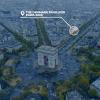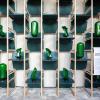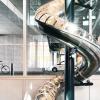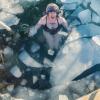
Sustainable Solutions for the World of Tomorrow
Denmark’s focus on sustainability reflects a long-standing Danish tradition of pursuing solutions that are sustainable in the long run with eco-friendly living and thinking at its core.
Denmark backs the interdependent and holistic nature of the UN’s Sustainable Development Goals and supports the creation of a sustainable, low-carbon, resource-efficient society across a wide number of private and public initiatives.
With a universal health care and free education, a generous social safety net, responsible businesses, a clean and efficient energy production, focus on personal freedom and much more, the country is considered one of the world's frontrunners in green growth.
A Nation of Green Power
Some of this success is down to the fact that we have the wind at our back. Denmark began investing heavily in wind power back in the 1970s and by 2022, 81.4% of the country’s energy was generated by renewable energy – 53% of which was wind energy, with biogas, biomass and solar energy contributing the rest. Home to one of the world’s largest wind turbine producers, Vestas Wind Systems, as well as the world’s largest developer of offshore wind, Ørsted, the country drives the adoption of global wind power, with Danish-led projects everywhere from North America to Asia and the Pacific. Ørsted was ranked as the world’s most sustainable company in 20201, while in 2024, Vestas was ranked the world’s third most sustainable company2.
As a nation, Denmark is taking the green transition seriously and has a number of projects working to that end. Among them, Power-to-X is a politically prioritized initiative established to accelerate the transition from fossil fuels to green energy. It investigates how to store green energy including wind and solar power as well as how to transform one type of energy into another.
The Energy Islands
Some areas of Denmark have already made the transition to renewable energy, including the island of Samsø, which has a 100 per cent reliance on renewable technologies. In 2020 it was awarded an EU prize for its innovative energy solutions, along with another Danish island, Bornholm, which has an ambition to be CO2 neutral by 2025 and a zero-emission and climate-friendly community by 2035.
Denmark plans to further enhance its position as a leader in green energy with the development of two new energy islands. The islands will function as offshore, green power plants and deliver green energy to millions of both Danish and foreign electricity consumers.
Photo:Mike Grønbech-Dam
Travel That Doesn’t Cost the Earth
In terms of shaping greener travel solutions, we’re doing our best to add some wonder to this serious subject too. Denmark is the home of Green Key, the international eco-label awarded to hotels that commit to sustainable practises; 68% of the hotels in Copenhagen itself have an eco-certification, so it’s easy to make a good choice. Eco initiatives to participate in during your stay include Go Boat tours, a self-piloted solar-powered boat tour available in Copenhagen and Aarhus, harbour and sea swimming, hiking, especially in our oldest national park, Thy, and Green Kayak, a pioneering kayak rental trip where you pay for your kayak by bringing back some trash from your trip. You can even go on an oyster safari, digging up oysters buried in the sand to eat, safe in the knowledge that you’re doing us a favour: these oysters are considered invasive species and the best thing you can do for Danish nature is eat them!
Engineering Solutions to Climate Challenges
Environmental science is also being pushed into the future by a wide range of Danish companies such as Grundfos. As one of the world’s leading pump manufacturers, Grundfos plays an important role in developing solutions for the world’s water challenges. Their range includes circulator pumps for heating and air-conditioning and other centrifugal pumps.
Meanwhile, Danish multinational Danfoss leads development within cooling and heating solutions, mobile hydraulics and drives used to efficiently control electrical motors. Its technologies empower smart communities and industries to create healthier and more comfortable climates in buildings and homes and to supply more food with less waste across the world.
Shaping Circular Solutions
Movement continues across all fields towards a circular society, in pursuit of the UN Development goals. One of the key ways Denmark approaches this is by working cross-disciplinary gathering professionals from different fields. Through it, the Danish Design Center has facilitated the birth of ten action points that set the direction for a new circular future to thrive. By engaging a wide range of professionals, the aim is to build a framework for local solutions creating a new society everyone wants to be part of.
Among the many circular solutions in Denmark, a new Biosolutions Center at the Danish Technological Institute seeks to support the food industry in making new and sustainable products and processes to use and reuse produce. The center wants to promote nature's own processes with facilities for industrial fermentation and biorefining. You can read more about our circular farming and food solutions in our press feature on Danish food.
Continuing the concept of collaboration across industries and social sectors, an important annual event takes place every year on Bornholm in celebration of the democratic dialogue with the aim to increase our mutual understanding. Folkemødet is a collaboration between political parties, grassroots, associations, businesses and cultural life.

Photo:SproutWorld
Greener Lifestyles
Sustainable ideas play out in large strategic spaces in Denmark, in politics, business and in daily life. Every day, small changes take place in Denmark to make life a little more sustainable. Denmark has the most effective circular system for reusing bottles globally. By charging a small deposit on all bottles and cans suited for reuse, the Danes return nine of ten items. Just looking at plastic alone, 96% of all plastic bottles are returned, and those that can’t be turned into new bottles are converted into pans, fleeces, windows and other consumer goods. The success of the systems stems from a strong civic mentality of reuse as well as an organization bringing together different sectors.
Vild med Vilje, ‘Willfully Wild’, is an organization striving to increase the biodiversity in Denmark where people live, work, and play, by advocating to leave nature be. By informing the public through TV shows and making partnerships with municipalities and big companies, the initiative has succeeded in creating a broad engagement across Danish society. It’s not the only small change making a difference: at SproutWorld, you can buy a pencil or make-up pencil that can be planted after use to have a second life as a flower. The company hopes to inspire people to adopt more sustainable ways of living through simple everyday actions.
Architecture That Shapes Behaviour
The Denmark Pavilion is another great example of sustainable thinking, the Danish way. A fully recyclable event pavilion, it is created from 600 chairs made from recycled Carlsberg kegs, old fishing nets, and discarded wood. Initially intended for The Denmark Pavilion during the Tokyo Olympics 2020, the chairs ended on quite a different journey and have since offered literal seats at the table of New York Climate Week, Milan Design Week and Roskilde Festival. And now, you can witness the chairs returning to their original purpose, as the foundation of The Denmark Pavilion in Paris 2024. After the Olympic Games, they will find a new home at the Fondation Danoise.
The interior and exhibition architecture has been created by Copenhagen-based architects BRIQ, along with the concept and content creation, while the structure was designed by Danish architects Lendager Group, who specialise in sustainable architecture and urban planning. For the full story, see our press feature all about the pavilion.
Copenhagen is the reigning World Capital of Architecture, an honour bestowed on the city by UNESCO last year in part in recognition of its focus on modern and sustainable design. Just some of the country’s most sustainable architectural works include the revived Carlsberg Byen, an old brewing district in Copenhagen that has been reinvented into a lively modern neighbourhood by BRIQ using a unique strategy for urban life and retail, to ensure a great experience for locals, visitors and inhabitants alike.
The magic of Hans Christian Andersen’s fairytales comes alive in H.C. Andersens Hus in Odense, a museum that fuses architecture with beauty and wonder as it combines world-renowned and much beloved stories with a wondrous landscape, creating one coherent experience outside as inside. In Aarhus, Bjarke Ingels Group is behind the very popular Aarhus harbour bath enabling safe swimming in the harbor year-round. The complex holds a wide range of pools as well as several saunas; it is a reflection of Denmark’s keen focus on clean water and respect for the environment that there are free local swimming pools in every one of its major cities.
Find out more about our sustainability wonders at The Denmark Pavilion.

Facts about Sustainable Denmark
|
EDITOR'S NOTESThe Denmark Pavilion is open to the public 26 July–11 August; 11am-10pm (except August 1, from 11:00 to 16:00). Admission is free. WHAT'S ON To stay updated re. What’s On at The Denmark Pavilion, go to: denmarkpavilion.com SoMe hashtag: #denmarkpavilion2024 FURTHER INFO / CONTACT INFORMATION Media attending the Olympic Games are more than welcome to visit The Denmark Pavilion and to contact the press team for further details. Please reach out to PR & Press Manager Lasse Emil Kristiansen at laekri@visitdenmark.com or +4531415390. WANT TO KNOW MORE? Visit stateofgreen.com HIGH RES. IMAGES TO GO Download images and videos from The Denmark Pavilion in Paris and from our extensive Denmark media database here: https://www.visitdenmark.com/denmark-pavilion/images ABOUT THE DENMARK PAVILLON During the Paris Olympics, visitors from around the world can enjoy a free visit to a small piece of Denmark at Champs-Élysées. Here, they can encounter Danish ideas that contribute to creating a better life and a better world. VisitDenmark, in collaboration with the Ministry of Industry, Business and Financial Affairs, leads this initiative, which is supported by Realdania, the Consul George Jorck and Wife Emma Jorck Foundation, and The Trade Council. |

Kommunikations- og udviklingsdirektør

PR & Press Manager, Italy & France
PR & Press Manager, UK





